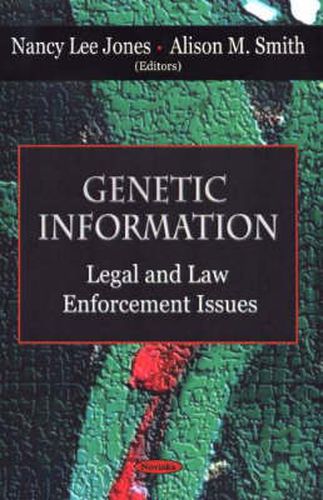Readings Newsletter
Become a Readings Member to make your shopping experience even easier.
Sign in or sign up for free!
You’re not far away from qualifying for FREE standard shipping within Australia
You’ve qualified for FREE standard shipping within Australia
The cart is loading…






On June 26, 2000, in a special ceremony at the White House, the completion of the ‘rough draft’ of the human genome was announced. This milestone, which has been compared to the discoveries of Galileo, and other advances in genetics have created novel legal issues relating to genetic information. The Human Genome Project, with its goal of producing detailed maps of the 23 pairs of human chromosomes and sequencing the three billion nucleotide bases that make up the human genome, has been instrumental in the identification of genes implicated in various diseases including glaucoma, colon cancer, and cystic fibrosis. With the identification of these genes comes the hope of genetic therapies to cure disease but this scientific accomplishment is not without potential problems. For instance the presence of a cancer causing gene may indicate a predisposition but does not guarantee that the person will contract the disease: How should an employer or insurer respond? The ethical, social, and legal implications of these technological advances have been the subject of significant scrutiny and concern. This new book discusses federal law, state statutes and legislation related to genetic information.
$9.00 standard shipping within Australia
FREE standard shipping within Australia for orders over $100.00
Express & International shipping calculated at checkout
On June 26, 2000, in a special ceremony at the White House, the completion of the ‘rough draft’ of the human genome was announced. This milestone, which has been compared to the discoveries of Galileo, and other advances in genetics have created novel legal issues relating to genetic information. The Human Genome Project, with its goal of producing detailed maps of the 23 pairs of human chromosomes and sequencing the three billion nucleotide bases that make up the human genome, has been instrumental in the identification of genes implicated in various diseases including glaucoma, colon cancer, and cystic fibrosis. With the identification of these genes comes the hope of genetic therapies to cure disease but this scientific accomplishment is not without potential problems. For instance the presence of a cancer causing gene may indicate a predisposition but does not guarantee that the person will contract the disease: How should an employer or insurer respond? The ethical, social, and legal implications of these technological advances have been the subject of significant scrutiny and concern. This new book discusses federal law, state statutes and legislation related to genetic information.